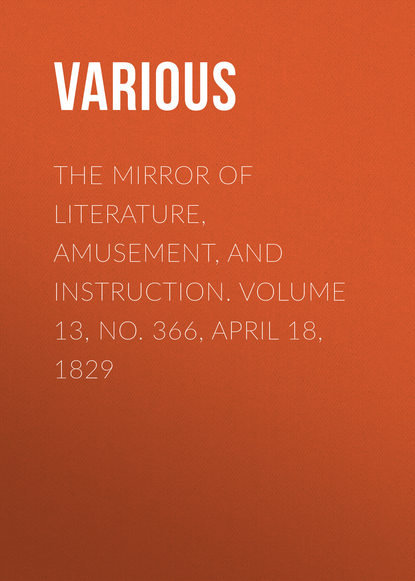По всем вопросам обращайтесь на: info@litportal.ru
(©) 2003-2024.
✖
The Mirror of Literature, Amusement, and Instruction. Volume 13, No. 366, April 18, 1829
Автор
Год написания книги
2018
Настройки чтения
Размер шрифта
Высота строк
Поля
"Lie still, for God's sake!" exclaimed Horatio, and the curtain slowly descended amid deafening roars of laughter, and shouts of hurrah! hurrah!
The next morning, at breakfast, Stubbs found all the daily papers on his table, pursuant to his directions. He took up one, and read, in large letters—"THEATRE. FIRST AND LAST APPEARANCE OF MR. HENRY AUGUSTUS CONSTANTINE STUBBS IN HAMLET."
He read no more. The paper dropped from his hands; and Mr. Stubbs remained nothing but a GENTLEMAN all the rest of his life—Blackwood's Mag.
LINES WRITTEN AT WARWICK CASTLE.[6 - These lines will form a beautiful pendant to the picturesque Engraving of WARWICK CASTLE, in No. 357 of the MIRROR—as well as to the very interesting antiquarian description by our esteemed correspondent L.L.]
BY CHARLES BADHAM, M.D. F.R.S
Professor of Medicine in the University of Glasgow
I.
I leave thee, Warwick, and thy precincts grey,
Amidst a thousand winters still the same,
Ere tempests rend thy last sad leaves away,
And from thy bowers the native rock reclaim;
Crisp dews now glitter on the joyless field,
The gun's red disk now sheds no parting rays,
And through thy trophied hall the burnished shield
Disperses wide the swiftly mounting blaze.
II.
Thy pious paladins from Jordan's shore,
And all thy steel-clad barons are at rest;
Thy turrets sound to warder's tread no more;
Beneath their brow the dove hath hung her nest;
High on thy beams the harmless falchion shines;
No stormy trumpet wakes thy deep repose;
Past are the days that, on the serried lines
Around thy walls, saw the portcullis close.
III.
The bitter feud was quell'd, the culverin
No longer flash'd, us blighting mischief round,
But many an age was on those ivies green,
Ere Taste's calm eye had scann'd the gifted ground;
Bade the fair path o'er glade or woodland stray,
Bade Avon's swans through new Rialtos glide,
Forced through the rock its deeply channell'd way,
And threw, to Arts of peace, the portals wide.
IV.
But most to Her, whose light and daring hand
Can swiftly follow Fancy's wildest dream!
All times and nations in whose presence stand,
All that creation owns, her boundless theme!
And with her came the maid of Attic stole,
Untaught of dazzling schools the gauds to prize,
Who breathes in purest forms her calm control,
Heroic strength, and grace that never dies!
V.
Ye that have linger'd o'er each form divine,
Beneath the vault of Rome's unsullied sky,
Or where Bologna's cloister'd walls enshrine
Her martyr Saint—her mystic Rosary—
Of Arragon the hapless daughter view!
Scan, for ye may, that fine enamel near!
Such Catherine was, thus Leonardo drew—
Discern ye not the "Jove of painters" here?
VI.
Discern ye not the mighty master's power
In yon devoted Saint's uplifted eye?
That clouds the brow and bids already lour
O'er the First Charles the shades of sorrows nigh?
That now on furrow'd front of Rembrandt gleams,
Now breathes the rose of life and beauty there,
In the soft eye of Henrietta dreams,
And fills with fire the glance of Gondomar?
VII.
Here to Salvator's solemn pencil true,
Huge oaks swing rudely in the mountain blast;
Here grave Poussin on gloomy canvass threw
The lights that steal from clouds of tempest past;
And see! from Canaletti's glassy wave,
Like Eastern mosques, patrician Venice rise;
Or marble moles that rippling waters lave,
Where Claude's warm sunsets tinge Italian skies!
VIII.
Nor let the critic frown such themes arraign,
Here sleep the mellow lyre's enchanting keys;
Here the wrought table's darkly polish'd plain,
Proffers light lore to much-enduring ease;
Enamelled clocks here strike the silver bell;
Here Persia spreads the web of many dies;
Around, on silken couch, soft cushions swell,
That Stambol's viziers proud might not despise.
IX.
The golden lamp here sheds its pearly light,
Within the cedar'd panels, dusky pale;
No mirror'd walls the wandering glance invite,
No gauzy curtains drop the misty veil.
And there the vista leads of lessening doors,
And there the summer sunset's golden gleam











